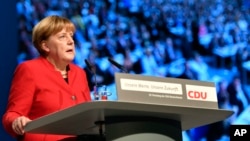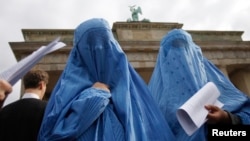German Chancellor Angela Merkel wants to ban the full-face veil worn mostly by Muslim women as a way to stop “any parallel societies developing” in Germany.
Merkel had just been re-elected as chairwoman of her Christian Democrat Union (CDU) party at its annual conference Tuesday when she said the burqa should be forbidden “wherever legally possible,” which would include schools, courts and other public buildings.
“In communication between people, which is of course essential to our living together, we have to show our faces,” she said.
While it is unclear whether the German constitution would allow a ban on the burqa, Merkel stressed the importance of integration for new-comers, and this includes rejecting the full-face veil.
Merkel’s comments come as she has seen her approval ratings drop because of her decision to accept around one million refugees into Germany during the ongoing migrant crisis in Europe.
She is facing a heavy challenge from the right-wing populist Alternative for Deutschland (AfD) party, which has been fueled by anti-immigration sentiment. Earlier this year, the Afd called Islam incompatible with the German constitution and called for a ban on minarets and the burqa.
“The 2017 election will be more difficult than any election before, at least since German reunification,” Merkel said, acknowledging there was a “strong polarization of our society.”
Should Germany implement Merkel’s plan, it would join three other European countries - France, Belgium and the Netherlands - that have specific bans on the face-covering garment.

